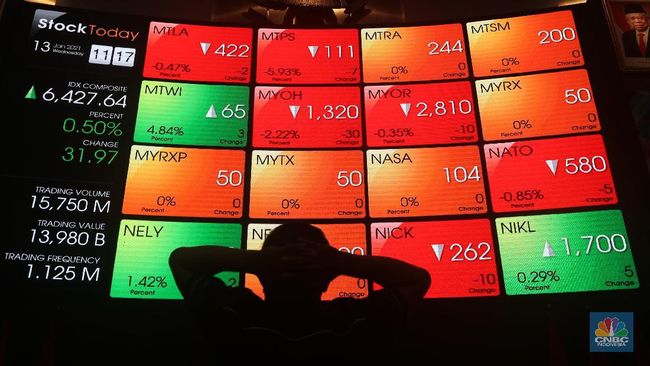Jakarta, CNBC Indonesia – The performance of the country’s financial assets tended to be inconsistent in yesterday’s trading (16/6/2022), stock indexes and yields (yield) Government Securities (SBN) strengthened and the rupiah weakened against the United States (US) dollar.
JCI managed to maintain its good performance in trading on Thursday (16/6), where the JCI was consistently in the green zone. In the first session, the JCI rose 1.62%, before finally slashing its strength and ending up 0.62% higher to 7,050.33.
Investors are still diligent in ‘parking’ their funds with net buy (net purchases) of Rp. 397.52 billion in all markets, with details of Rp. 392 billion in the regular market and Rp. 5.38 billion in the cash and negotiated market.
As fate would have it, the majority of stock indexes in Asia were under pressure. Hong Kong’s Hang Seng Index fell 2.17% to 20,845.43 and became the leader of the declines as several Chinese technology stocks listed on the Hong Kong exchange were the burden of the Hang Seng index’s movement yesterday.
The Shanghai Index closed down 0.61% to 3,285.38, the Straits Times lost 0.27% to 3,097.43, and the ASX 200 was down 0.15%.
While for the rest, Japan’s Nikkei index closed up 0.4% to 26,431.199, South Korea’s KOSPI rose 0.16% to 2,451.41.
The rupiah was less fortunate than the rupiah. The country’s currency should end up corrected 0.17% to Rp 14,765/US$ and be the lowest point since April 2020 or 18 months ago.
In fact, the rupiah had strengthened until the middle of yesterday’s trade, and even strengthened by 0.34% significantly to Rp. 14,690/US$.
Thus, the rupiah has weakened for four consecutive days in front of the greenback.
In the bond market, the price of the majority of government bonds or Government Securities (SBN) ended higher yesterday, with investors still evaluating the latest monetary policy from the US central bank (Federal Reserve/The Fed).
The majority of investors hunt for SBN after a few days of releasing them, marked by lower yields (yield). Only long-term SBN, with tenors of 25 and 30 years, tend to be released by investors, marked by an increase yield and lower prices.
Yield The 10-year SBN, which is the state’s benchmark SBN, fell 2.4 bps to 7.411% in yesterday’s trading.
However, at the same time the yield on the 10-year US Treasury also fell to 3.246%.
Therefore, spread The interest rate (difference) between the US and Indonesia is not too far off at 4.16% or 416 basis points. So, it can trigger capital outflow and investors turned to the US bond market, in search of profits.
This may be the cause of the decline in the rupiah yesterday.
According to a 2-week survey conducted Reutersindicating that market participants are adding to short positions (short) rupiah.
The survey uses a scale of -3 to 3, a positive number means short rupiah currency and buy (long) US dollar and the closer to 3, the bigger the position short Asian currency.
The latest survey released Thursday (16/6) showed the figure for the rupiah at 1.33. The bigger the position longthen the dollar exchange rate tends to strengthen, which is bad news for the rupiah.
|
Sumber: Refinitiv- – |
–


